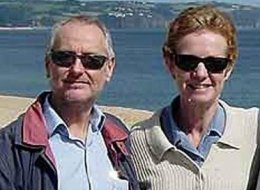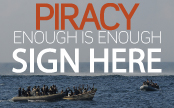£100,000 deal with Somali pirates falls through as UK government says it will not allow payments to hostage-takers
A British couple kidnapped by Somali pirates six weeks ago were on the verge of being freed for a £100,000 ransom when the government blocked the deal, the Observer can reveal.
The money to release Paul and Rachel Chandler, taken hostage from their yacht on 23 October, had been agreed by a British negotiator two weeks ago. Foreign Office officials rejected the breakthrough, saying that they would not allow payments to hostage-takers.
The disclosure will increase the anguish for relatives of the Chandlers, from Tunbridge Wells, Kent, after concern that Britain’s policy of not talking to kidnappers will endanger their lives.
Nick Davis, who negotiated the deal, yesterday accused the Foreign Office of playing “stupid games” after revealing how the Chandlers’ captors had agreed to an offer that would have released the couple at a fraction of the £4.3m ransom previously demanded.
Davis, chairman of the industry anti-piracy organisation, the Merchant Maritime Warfare Centre (MMWC), accused the government of pursuing a flawed diplomatic strategy that could imperil the couple. The centre was set up last year to educate the shipping trade in anti-piracy measures and is funded by industry groups and insurers.
Davis said: “We could have had the Chandlers out weeks ago. The money was available, the pirates were keen to let them go, it was just a case of pushing the button. It was all ready to go. The pirates don’t want to keep the Chandlers any longer. It’s not good for them either.
“A figure of £100,000 had been agreed and put in place. It’s still ready the second that I get given the nod. Then I can get them out and we can release the funds and get it to [the pirates].”
The Chandlers have been held captive for 45 days in Somalia. They were sailing from the Seychelles to Tanzania as part of a round-the-world tour when their 38ft yacht, Lynn Rival, was boarded by gunmen while they slept.
Davis said he had decided to go public because of his frustration at the negotiations and because of contacts from Somalia suggesting that Rachel Chandler, who is 55 and a retired economist, was becoming extremely frail. Her health was under pressure, he said, from constant shuttling between safe houses around the Somalian port town of Haradheere, to prevent the pair being caught by armed Islamist cells. “She can’t cope with this. She’s very weak and deteriorating; she’s in a bad way and we need to get her home,” he said.
The deal was agreed on 21-22 November but, according to Davis, fell through because the Foreign Office would not deviate from its policy of not paying hijackers nor would it communicate the breakthrough to relatives of the Chandlers in the UK. “The fact that professionals can affect their release should be clearly articulated to the family of the Chandlers so they can decide whether to support it,” he said.
Davis, who has visited pirate contacts in Haradheere four times in the past two years, said concern was mounting over the government’s policy of negotiating the Chandlers’ release through middlemen, and that the “third-party” individuals involved seemed incapable of delivering a settlement.
A Foreign Office source said it had had little contact with the couple since they appeared on a video link two weeks ago.
Davis said: “We’re in a situation where the people that can effect a release are being effectively blocked by diplomatic efforts because they [the British government] are just playing another game, that’s the problem. There are secret games, just stupid games going on with the government diplomatically that does not work in the families’ favour.”
His exasperation corroborates the frustration of experienced Scotland Yard hostage negotiators from SCD7 command, who are also involved in the Chandler negotiations. Met sources have indicated frustration at lack of progress, with one source saying that an opportunity to secure release was “missed early on”.
The revelations will intensify scrutiny of the government’s “hands-off” policy of refusing to talk directly with kidnappers or terrorists. The approach was criticised during attempts to five Britons kidnapped in Baghdad two years ago, a strategy that left UK officials reliant on mediators and has not prevented four of the five hostages being killed.
Last night Mrs Chandler’s brother, Stephen Collett, and Mr Chandler’s sister, Jill Marshment, refused to comment on the revelations.
A Foreign Office spokesman said: “We do not discuss operational details in cases like this. We are using our contacts in the region to gain information and bring influence to bear on the hostage-takers. We will talk to anyone who may be able to help secure their release, but we do not make substantive concessions to hostage-takers.”
Davis said: “There is a political agenda that’s far removed from what the public think is the right and respectful thing to do as regards the Chandlers. Let’s get it resolved and make sure the government looks like it’s won at the end of the day. They need to let us speak to the right people and get the Chandlers out of there, or do they want to keep it a secret squirrel society?”
The £100,000 deal was struck shortly after the Chandlers appeared in a video broadcast on 20 November and appealed directly to the British government to open talks for their release. The footage shows the couple looking thin and fatigued, with Mr Chandler, a 59-year-old retired quantity surveyor, pleading for the government to start negotiating over a ransom and saying they might otherwise be killed within a week.
Davis said the pirates were extremely keen to strike a deal, but increasingly “fed up” over the lack of a settlement. He said the ransom fee was ready to be released instantly and had been raised through the advance sale of media rights, such as book deals and interview rights.
News of the deal coincides with fresh concerns over the protection of shipping routes off the coast of Somalia. Britain’s private security industry is debating having officials routinely employed on all shipping routes off Somalia. Davis’s organisation even has a contract with Yemen’s navy to provide armed escorts for vessels crossing the Gulf of Aden.
At least six UK private security firms are operating off Somalia, employing former personnel of the Special Boat Service, the Royal Marines landing craft squadron and the Royal Navy. So profound is the threat of piracy that deployment to the Gulf of Aden has become the industry’s new growth area.
A source at the British Association of Private Security Companies said: “Demand in Iraq has gone down, Afghanistan never took off to the extent people expected – but Somalia is booming.”
More than 168 incidents of piracy were reported off Somalia in the first nine months of 2009 compared with 111 in all of 2008, according to Lord Jopling, a Nato special adviser on piracy. More than 500 hostages have been taken in 2009 so far, of whom 150 are still held by the pirates.

 If the Chandlers were your relatives, what would
If the Chandlers were your relatives, what would 
